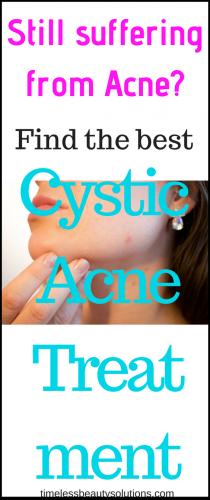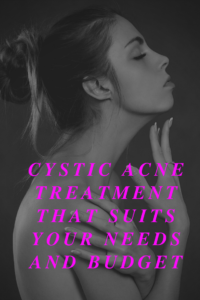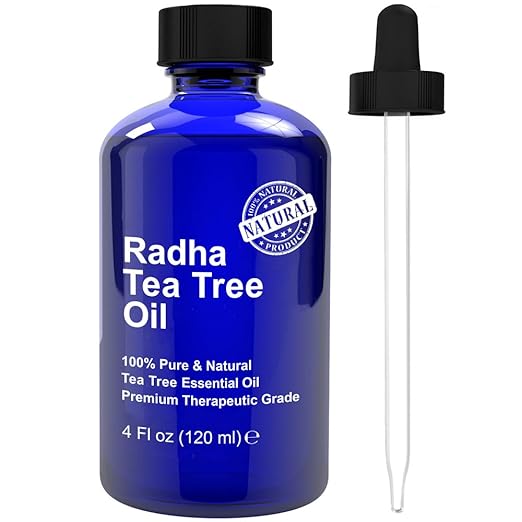Before we look at different cystic acne treatments available, we`ll first try to understand what cystic acne is, the causes and later look at different treatments.
A cystic acne is the clogged pores that get filled with oil and inflame the dead skin. When these pores rupture, the inflammation spills out onto the surrounding tissue. A cyst is then formed around the area to stop the spread of inflammation.
What Does Cystic Acne Look Like Under The Skin
These are the big, swollen, and reddish zits that can be felt under your skin. Unlike whiteheads or blackheads, they do not rise out to the skin surface. So, they are difficult to pop. The inflammation makes them painful.
Special care is required for cystic acne treatment. These underground pimples are harder to get rid of than the regular pimples. It can also cause scarring if not treated correctly.
Who Are Affected By Cystic Acne? 
The cystic acne is most likely to develop in the teens or early 20s. Although, it is known to strike at an early age of around 8 as well as the old age of around 50.
Cystic acne is more common in men than women. Women often get it in the lower half of their face. It can also affect the chest, upper arms, back, and shoulders.
Those affected with cystic acne usually struggle with a number of painful lesions under their skin.
These blemishes are embedded too deep within the epidermis layer of skin. Those suffering from cystic acne may also exhibit open or closed comedones. They can very well result in permanent scarring.
What Causes Cystic Acne
A variety of factors are responsible for causing cystic acne such as the genetics and hormonal changes. A change in lifestyle such as diet can lead to high-stress levels and is also a contributing factor in causing cystic acne.
Genetics
Cystic acne more often than not runs in the family. If either one or both parents have had a severe case of cystic acne, then it increases the chances of you having it by a good margin.
Pore Blockages
When the pores under the skin get blocked with excess sebum, oil, dead skin cells, or bacteria, it can result in an infection. The most severe pore blockages lead to cystic acne.Check an earlier post on removing acne.
Hormones
The oil glands get overstimulated because of an excess of androgen hormones in our body. This results in oil production which is larger in quantity than normally required. This excess oil gets stuck inside the pores trapping bacteria which later multiplies resulting in inflammation.
High-Stress Levels
The body responds to rising stress level is producing cortisol which is another hormone that is responsible for overstimulating the oil glands.
Humidity And Sweating
Hot and humid conditions encourage the acne production. While wiping away the sweat with hands, you spread oils and bacteria that lead to infection.
Drugs And Chemicals
Some drugs and chemicals such as corticosteroids, lithium, phenytoin may have side effects that can cause eruptions which are similar to cystic acne.
Cystic Acne Treatment 
Here are some of the most effective ways to safely rid yourself of the cystic acne pimples:
Use A Cleanser
A twice-a-day deep-cleansing wash clears the pores of excess oil and dirt. Skin cleaning from oil and debris helps to decrease the spread of infection and irritation.
Multivitamins
Consult a doctor for a daily multivitamin intake. The zinc in vitamin help reduces the inflammation and vitamin E heals the skin.
Spot Treatment
Applying a warm compress for about 5 minutes three times a day helps in bringing a pimple to the head. Later dry it by dabbing on acne gel or cream twice a day.
Ice The Pimple:
Applying the ice cube directly for a couple of seconds constricts the small blood vessels that are feeding the cyst. The ice treatment thus helps in reducing the size and redness of cystic acne.
Topical Treatment
Apply over-the-counter creams containing pimple-fighting ingredients such as benzoyl peroxide to the skin with acne. Using it consistently stops the formation of new zits.
Essential oils (such as tea tree, and lavender) can help fight cystic acne. Apply 2-3 drops to the skin with acne. Combine these essential oils with a carrier oil (such as jojoba or coconut oil) in case of sensitive skin.
Tea tree reduces the number of lesions and works similarly to topical treatments. It also has antimicrobial and anti-inflammatory properties.
While using essential oils, avoid direct sun exposure as the UV rays make skin more sensitive. It might increase skin redness or irritation. If essential oils are causing skin irritation, stop using it.
Oral Medication:
Doctors may recommend some oral medications in cases dealing with severe acne. These antibiotics help in killing bacteria to stop the spread of infection. For example Zithromax, Doryx, Bactrim and in most severe cases, Accutane.
Birth Control Pills may help women to help regulate hormones responsible for causing cystic acne.
Note: Do not take any medication without consulting your doctor.
Cortisone Shot:
If the above treatments aren’t helping, consult a doctor about a cortisone shot. A cortisone is a steroid that is responsible for reducing any inflammation underneath the skin. It also reduces the swelling. But do inform yourself of Cortisone’s side effects
How To Prevent Cystic Acne
Follow these blemish-fighting methods to help keep your skin free of underground pimples.
No Picking Or Popping Of Pimples:
Keep your fingers away from cystic acne pimples, due to their depth render popping or picking of pimples completely ineffective.
Picking at pimples makes it worse and can lead to permanent scarring. So, whatever you do, just don’t ever pop a pimple or cystic acne.
More than likely, you will end up increasing the healing time. You will spread the breakout under the skin even more. Not to forget the scarring that will last long after a pimple is healed or worse, forever.
Avoid heavily scented moisturizers. Use effective exfoliants for healthy skin growth. Ensure that the exfoliants are not harsh or too abrasive.
Moisturize your skin daily. Some good options include glycolic acid and fruit enzymes. Use natural ingredients and sunscreen while out in the sun. Visit an earlier post on the best product to clean your face.
- Mind The Touching
Everyday things that touch your face or skin must not be washed with detergent and bleach that are heavily scented, have chemicals, and are too strong.
It will reduce the chances of causing skin irritation. It is best to use natural and unscented products for doing laundry. Make a habit of changing pillowcases and face and bath towels frequently.
Adopt A Healthy Diet:
A healthy skin-clearing diet wouldn’t necessarily make the acne go away, but the intake of necessary vitamins and nutrients can definitely help. For example, Vitamin B6 helps even out hormone levels and beta-carotene give skin a smoother texture.
Avoid Intake Of Dairy, Sugar, Caffeine, Chocolate, Low-fiber food, Highly Processed food, and Fast food
Add To Your Diet: Probiotic-rich food, High-Zinc and Vitamin A-rich food, Fiber-rich food, and High-quality protein-rich food
Supplements: Probiotics, Omega-3 fatty acids, Zinc, Vitex, and Guggulsterone
- Avoid Stress:
Stress only makes things worse. So, find ways to reduce stress as stress causes the body to release hormones that cause acne. You can try natural stress relievers to lessen stress.
Regular Exercise And Proper Sleep:
The lymphatic system benefits immensely from exercising regularly. detoxifying your entire body. It is excellent for detoxification of the body, mood, and self-esteem.
Getting proper sleep is beneficial for overall health which includes good hormone level balance.
Conclusion
Cystic acne can be diagnosed by any dermatologist or a general physician due to its appearance. The inflamed skin lesions are very telling.
It is vital to get a professional consultation as they can correctly rule out other skin conditions that may resemble or act like acne such as rosacea, milia, etc.
Cystic acne treatment can be challenging. The best way to deal with it is through natural methods. The healing takes time.
Once you get rid of the cystic acne, stick with a healthy diet, adopt a natural skincare routine, and maintain a healthy lifestyle in order to prevent the acne from returning.
In case the skin is not responding to any treatment, see the doctor immediately. The physician may have to perform the skin lesion culture in order to ensure that the skin is not suffering from folliculitis.
I hope you found value in this post, if you have any questions, do leave me a message below and I will get back to you.If you know anyone who can benefit from this post, do share in social media so others can benefit.

I wonder if cystic acne is what I developed under my eye a few months ago. This sounds exactly like the big pimple/sore I had. It is still healing! It is almost gone, but it has taken months to heal up. I think I got it from stress. Thanks for sharing this!
Glad your cystic acne is gone, just save the post or bookmark it so you can read it should your acne flare up.
Tea tree oil is always my go to for facial treatments. These are great tips
Thanks for stopping by, like you, I always turn to tea tree oil for many different needs.